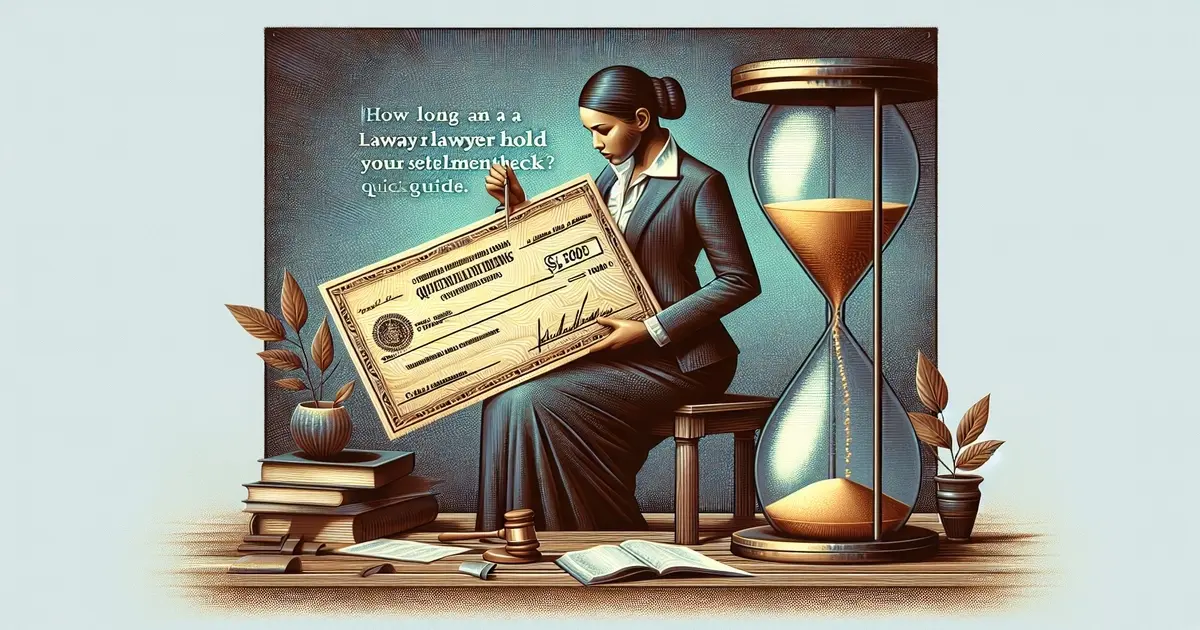What Happens If a Lawyer Loses a Case: Do They Get Paid?
Have you ever wondered about the ripple effects when a lawyer or attorney doesn't win in court, especially under a contingency fee arrangement or contingent fee with the jury involved? It's a scenario that's as old as the legal profession itself. Yet, it remains shrouded in mystery for many outside the courtroom, mainly when it involves an attorney or personal injury lawyer. Historically, the outcome of a case has shaped the future of the individuals involved and set precedents that influence legal practices and judicial decisions to this day.
This post aims to demystify what happens behind the scenes and in the aftermath for lawyers and their clients when a case is lost. We'll explore the immediate consequences, possible recourse, and how law attorneys bounce back from setbacks, ensuring you're informed about this critical aspect of legal proceedings.
Table Of Contents
Key Takeaways
- Understanding the payment structure, especially contingency fees, is crucial before hiring a lawyer for your case. This knowledge ensures you're not caught off guard by unexpected law expenses.
- Contingency fees in the law mean you only pay if you win. Hence, discussing all costs covered under such agreements, including case preparation, filings, and expert testimonies, is essential.
- The variability in fee percentages among lawyers highlights the importance of shopping around and negotiating contingency fees to find terms that best suit your financial situation.
- Engaging in thorough pre-agreement discussions with your lawyer about their approach to your case, the risks involved, and the cost implications can significantly impact your decision-making process.
- Personal injury lawyers take on significant risks with contingency fee arrangements, underscoring the importance of understanding the stakes for both parties involved in such agreements.
- Ultimately, choosing legal representation should be a decision with comprehensive knowledge of potential costs, the lawyer's track record, and how they plan to handle your case.
Understanding Lawyer Payment Methods
Hourly Rates
Lawyers often charge by the hour for their services. This method involves tracking the time spent on a law case and billing each or part of an hour. It's common in cases where the workload is unpredictable.
Clients receive detailed invoices showing how much time the lawyer spent on various tasks. This transparency in law allows clients to see exactly what they're paying for. However, budgeting can be challenging because the total cost of a legal case depends on its duration.
Flat Fees
Lawyers offer flat fees for specific services. This payment structure is straightforward: the lawyer and client agree on a set price for a defined piece of work, regardless of time spent.
Flat fees are popular for routine legal matters, such as drafting a will or handling a straightforward divorce. They provide certainty regarding legal costs, making law budgeting more accessible for clients. But, they might not cover unexpected law complexities that arise during a case.
Contingency Fees
Contingency fee arrangements are based on outcomes. Lawyers only get paid if they win the case or secure a settlement for their client. The law fee is usually a percentage of the recovered amount.
This method aligns the lawyer's interests with the client's, motivating them to achieve the best possible outcome. It also makes legal representation accessible to those who might not be able to afford it otherwise. However, clients should understand that if the case is successful, they might owe a significant portion of their award to their lawyer.
Payment Impact
Payment methods significantly affect a lawyer's approach to a case. Hourly rates for the law may encourage thoroughness but can lead to higher costs if a law case drags on. Flat fees in law motivate efficiency but might result in less personal attention if complications arise. Contingency fees ensure lawyers are results-driven but could lead them to take on only cases with high winning potential.
Clients must consider these implications carefully when choosing a lawyer. The right payment arrangement can provide peace of mind and align the lawyer's and client's expectations.

Exploring Contingency Fees
Fee Structure
Contingency fees offer a unique approach to lawyer compensation. Lawyers calculate these fees based on the case's outcome. They only receive payment if they win, tying their law earnings directly to their success.
This structure benefits clients who may be unable to afford upfront legal fees. It motivates lawyers to work diligently, as their payment depends on winning the case.
Client Benefits
Clients see significant advantages with contingency fees. They face no financial risk in hiring legal representation for their law case. This arrangement makes legal services accessible to those who might otherwise forego legal action due to cost concerns related to the slaw.
Moreover, this fee structure aligns the lawyer's interests with the client's. Lawyers are motivated to achieve the best possible outcome, knowing their payment hinges on success.
Drawbacks
However, there are drawbacks to consider. Some lawyers might not take cases contingently unless they believe a win is likely. This can limit access for cases with uncertain outcomes.
The percentage taken as a fee by law can be substantial, sometimes up to 30-40% of the awarded amount. While clients do not pay if they lose their law case, they must share a significant portion of their winnings.
Comparison with Flat Fees
Unlike flat fees, where law clients pay a predetermined amount regardless of the case outcome, contingency fees provide flexibility and financial safety for law clients. However, flat fees can sometimes offer more predictability in legal expenses, which some clients may prefer.
Costs Covered Under Contingency Agreements
Court Fees
These costs can include filing fees, which are mandatory for initiating a lawsuit. Lawyers on contingency agreements advance these fees, understanding that they will recoup their expenses from the final settlement or award. This arrangement allows clients to pursue justice without financial strain from day one.
Investigation Costs
Investigation expenses are another significant category covered by attorneys working on a contingency basis. These include obtaining medical records, hiring expert witnesses, and other necessary expenditures to strengthen a case.
Such costs are pivotal in building a robust argument against insurance companies or other defendants. They are typically deducted from the settlement or award, aligning the lawyer's goal with the client's need for a favorable outcome.
Expert Witnesses
Hiring expert witnesses is often essential for proving the extent of injuries or validating claims in complex cases. Lawyers may cover these costs upfront.
The fees for expert witnesses vary widely but represent a critical investment in the case's success. They provide authoritative testimony that can sway negotiations with insurance companies or court decisions.
Miscellaneous Expenses
Miscellaneous expenses might include travel costs, postage, and document reproduction fees. While smaller than other categories, they add up over time and are usually covered by attorneys under contingency agreements.
These expenses are essential for the smooth operation of a case but are often overlooked when considering the overall cost. They, too, are deducted from any financial recovery obtained on behalf of the client.
Fee Percentage Variability
Case Complexity
Lawyers often adjust their fee percentages based on the complexity of a case. Complex cases require more resources, time, and expertise. This justifies higher fees. For instance, medical malpractice suits are intricate. They demand extensive research and expert testimonies. Hence, lawyers may take a more significant percentage from the settlement or award.
The complexity factor ensures that lawyers can adequately prepare and offer the best representation. However, lawyers might be less inclined to tackle challenging cases.
Potential Value
The potential value of a case also influences fee percentages. High-value cases might see lower percentages. This is because even a smaller percentage of a large sum can cover costs and ensure fair compensation for the lawyer's efforts.
Conversely, lawyers might charge higher percentages in cases with lower expected settlements. This compensates for the effort while ensuring the client's victory is still financially beneficial.
Negotiability
Fee percentages are not set in stone. They are negotiable within a standard range. Clients should feel empowered to discuss fees with their attorneys. Understanding that costs can vary offers clients some leverage in negotiations.
Negotiating fees can lead to a more satisfactory agreement for both parties. It fosters transparency and trust in the attorney-client relationship.
Negotiating Contingency Fees
Fee Negotiation
Clients can negotiate better terms in their contingency fee agreements. It's crucial to understand that not all attorneys offer the same rates, which can often be adjusted based on the case's complexity. Clients should feel empowered to discuss the contingency fee percentage with their attorney openly.
Asking about the overall compensation structure before signing a contingency fee agreement is essential. This discussion ensures clients know how much their potential settlement or award goes towards attorney fees. Understanding this breakdown is critical in making an informed decision.
Agreement Clarity
It cannot be overstated how important it is to understand all terms of the contingency fee agreement before signing. Clients should know what expenses are covered under the contract and which might be billed separately. Expected costs not always included are court filing fees, costs to obtain medical records, and expert witness fees.
It is vital to ask for a clear written explanation of all terms related to compensation, including how disbursements for expenses are handled. This clarity helps avoid any surprises regarding financial obligations after a case.
Essential Questions
Clients should prepare a list of questions to ask their lawyer about the contingency fee process. Key questions include:
- What percentage of the recovery does the contingency fee represent?
- Are there circumstances under which the fee percentage might change?
- How are case expenses handled if there is no financial recovery?
Asking these questions ensures clients have a comprehensive understanding of their financial commitments. It also provides insight into the lawyer's confidence in the case based on their willingness to invest resources upfront.
Pre-Agreement Lawyer Discussions
Financial Terms
Before signing a representation agreement, it's crucial to have a clear understanding of all financial aspects. This includes payment structures and case expenses. Prospective clients should ask detailed questions about how fees are calculated and what costs might arise during the case. It's also important to discuss who is responsible for other expenses, such as court fees or charges for expert witnesses.
Clients should feel comfortable asking their prospective lawyer anything related to finances. Clarity at this stage can prevent misunderstandings later on. If the firm offers different payment options, each should be explained thoroughly. This ensures clients make informed decisions that align with their interests.
Outcome Expectations
Understanding potential outcomes is essential. Lawyers cannot guarantee results, but they can offer insights based on experience. Discussing possible scenarios helps set realistic expectations for both parties.
This conversation should cover best- and worst-case scenarios, including the implications of losing a case. Discussing what happens if an unfavorable settlement offer is received or the case goes to trial and is lost is beneficial. Knowing the lawyer's plan for various outcomes can help clients feel more prepared and less anxious about the process.
Transparency and Communication
A successful lawyer-client relationship relies on transparency and open communication from the beginning. Both parties should be upfront about their expectations, concerns, and potential changes that could affect the case.
It's advisable to establish how often you will receive updates about your case and through what means (e.g., email, phone calls). Agreeing on a regular communication schedule keeps clients informed and involved in their cases without constant worry or confusion.
Risks for Personal Injury Lawyers
Contingency Basis
Personal injury lawyers often work on a contingency basis, which means they get paid only if the case wins. This gamble can lead to high rewards but also comes with significant risks.
Lawyers invest time and resources into each case without upfront payment. They cover costs like court fees and investigations out of their own pockets. If the case loses, these investments are not recovered. This financial risk is a significant challenge in the personal injury field.
Resource Investment
The investment in a personal injury case is not just financial. Personal injury attorneys dedicate countless hours to building a solid case for their clients. They gather evidence, consult experts, and negotiate with insurance companies.
This effort is not guaranteed to succeed. Winning a case can require extensive legal knowledge and negotiation skills. Despite their best efforts, some cases do not favor the personal injury victim. When this happens, the time and effort spent are uncompensated.
Balancing Act
Successful cases for personal injury law firms must offset those that don't win. A single victory can bring substantial fees, supporting the firm's operations and funding future cases. However, this model requires a careful balance.
Firms must wisely choose the cases they take on, assessing each one's potential for success. They must also manage their resources efficiently to sustain their practice over time. It's a constant balancing act between risk and reward in the pursuit of justice for personal injury victims.

Importance of Knowing Costs
Financial Considerations
Understanding all potential costs involved in a legal case is crucial for clients. It's not just about the lawyer fees. There are many other expenses associated with a lawsuit. These might include court fees, costs of obtaining medical records, and expert witness fees, among others.
Clients should know that these costs can significantly impact the final amount they receive from a settlement or judgment. Unexpected expenses often surprise clients and can lead to dissatisfaction with the outcome, even if the case is won.
Request Breakdowns
Clients must ask their lawyers for a detailed breakdown of costs. This includes how these expenses are calculated and when they will be billed. Some lawyers deduct costs from the settlement amount, while others may require payment upfront. Knowing this information helps clients manage their finances better and avoid surprises.
A detailed breakdown also allows clients to understand what they are paying for. This transparency builds trust between the lawyer and the client. It ensures there are no misunderstandings about financial matters as the case progresses.
Impact on Settlements
The impact of costs on settlements cannot be overstated. High legal expenses can eat into the settlement amount, leaving clients with less money than anticipated. This is especially critical in personal injury cases where the settlement may need to cover long-term medical bills and loss of income.
Clients should discuss with their lawyers how best to minimize expenses without compromising the quality of their legal representation. Sometimes, negotiating specific fees or choosing more cost-effective strategies can make a big difference in the net result.
Deciding on Legal Representation
Expertise Matters
Choosing the proper legal representation often starts with assessing a lawyer's expertise. Not all lawyers have the same skills or experience. Some specialize in criminal defense, while others focus on civil cases like personal injury or family law. Select a lawyer with a proven track record in the specific area of your case.
Clients should look for lawyers who offer free consultations. This meeting lets you discuss your case and gauge whether the lawyer understands your needs. It also provides an opportunity to ask about their experience and success rate with similar cases.
Payment Structures
Lawyers offer various payment arrangements, including hourly rates, flat fees, and contingency fees. Each has its benefits and drawbacks, depending on your situation.
Hourly rates are straightforward but can accumulate quickly, making them suitable for those who need extensive legal services. Flat fees provide certainty regarding costs but might not cover all aspects of a case. Contingency fees mean the lawyer gets paid only if you win, which can be appealing but also risky for the lawyer.
It's essential to discuss payment options upfront. Understand the full scope of what each fee includes and doesn't include. This clarity prevents surprises down the line.
Communication Style
A good working relationship with your attorney is pivotal. It would help if you had someone who communicates clearly and promptly. Lawyers vary in how they interact with clients—some prefer phone calls, while others use email or face-to-face meetings.
Ensure your lawyer is willing to explain complex legal concepts in simple terms. They should inform you about your case's progress and be accessible when you have questions or concerns.
Trust and Confidence
Ultimately, confidence in your lawyer's ability to handle your case is paramount. This confidence stems from their expertise, communication style, and understanding of your goals.
Remember, a more expensive lawyer does not always equate to better representation. Assess each attorney based on their qualifications, approach to your case, and compatibility with your communication preferences.
Summary
Choosing the right lawyer for your case is crucial, especially when understanding how they get paid. Knowing the ins and outs can save you a headache later, whether through contingency fees or other payment methods. Remember, not all lawyers are created equal. Their fees, the costs they cover, and their willingness to negotiate can vary widely. It would help to have explicit conversations about these aspects before signing agreements. This ensures you're not caught off guard by unexpected expenses or disappointed by the level of service received.
Making an informed decision about legal representation involves weighing risks, understanding potential costs, and knowing what to expect from your lawyer's payment structure. Don't shy away from discussing fees upfront. It's better to ask too many questions than be surprised later on. Ready to find a lawyer who meets your needs? Start your search confidently, armed with the knowledge you've gained here.
Frequently Asked Questions
Related Post
What Does a Lawyer Wear?
Did you know that 75% of people form their first impression of a lawyer based on appearance, impacting judges and the justice system?
Read MoreWhat Are the Highest Paid Lawyers?
Have you ever wondered why some lawyers in their legal career, specifically big law investors, drive luxury cars while others seem to scrape by with their jobs and money?
Read MoreHow Do Pro Bono Lawyers Get Paid?
Have you ever wondered how lawyers, often working for nonprofit organizations or on contingency fees, keep the lights on while providing free legal services for disability cases?
Read MoreHow Long Can a Lawyer Hold Your Settlement Check?
Have you ever wondered why getting your hands on your settlement check feels like forever, with money sitting in trust accounts, balancing client trust?
Read MoreHow to Become a Lawyer
Did you know that there are over 1.3 million active attorneys in the United States alone, including law students from law schools and those in law firms practicing law?
Read MoreWhy Would a Lawyer Call Me?
Ever wonder, "Why would a lawyer call me on the phone?" It's not always as ominous as it sounds; sometimes, it's just unsolicited contact for legal services or reaching out to potential clients.
Read More






